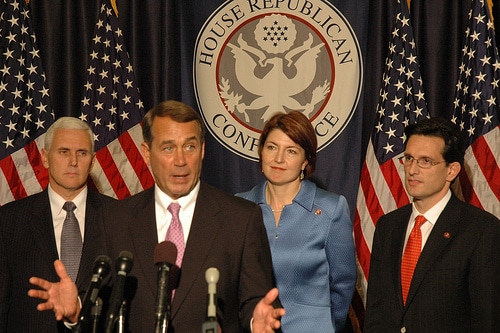For all the florid talk of bipartisanship, Congress has precious little to show for its efforts. It has only been a little over a week since President Obama was inaugurated, and, despite promising to work hand in hand with the new administration and Democratic majorities, the GOP and its ideological allies are already back to their old obstructionist ways.
Case in point: the much ballyhooed $825 billion stimulus package – i.e. the American Recovery and Reinvestment Bill of 2009 – that the president has made a top priority.
The massive bill, which contains goodies for practically every sector of the ailing economy, has been the subject of withering criticism by Senate and House Republicans alike, who object to many of its key provisions, including funding for healthcare programs (see: the whining about the “hundreds of millions” spent on “contraceptives”) and public infrastructure projects. (Their plan, not surprisingly, is all about tax cuts.)
Senate Minority Leader Mitch McConnell and his counterpart in the House, John Boehner, have been on the attack, peddling lies and distortions about the bill’s contents to whoever is willing to listen, with the latter explicitly urging his colleagues to vote against it.
Last week, the right-wing commentariat went into a tizzy over reports of an unofficial analysis of the stimulus package released by the Congressional Budget Office (CBO) that showed that a large portion of the funds would not be disbursed until well after 2010. The Wall Street Journal and other reliable bastions of the conservative press exulted in the report, deriding the Democrats’ plan as a “legislative freight train” and a foil for Obama’s wasteful, politically-motivated spending agenda.
The only problem is that said CBO report doesn’t actually exist. As a CBO aide explained to The Huffington Post’s Ryan Grim: “We did not issue any report, any analysis or any study.” What the right-wing latched onto in masse was only an unofficial analysis of a small portion of the package, as Grim explains:
“Rather, the nonpartisan CBO ran a small portion of an earlier version of the stimulus plan through a computer program that uses a standard formula to determine a score – how quickly money will be spent. The score only dealt with the part of the stimulus headed for the Appropriations Committee and left out the parts bound for the Ways and Means or Energy and Commerce Committee. Because it dealt with just a part of the stimulus, it estimated the spending rate for only about $300 billion of the $825 billion plan. Significant changes have been made to the part of the bill the CBO looked at.”
Indeed, the actual analysis, which was released yesterday (and which you can read on the director’s blog), found that the bill would inject approximately $526 billion, or 65 percent of the total, in new spending into the economy by the end of September 2010 and have a “noticeable impact on economic growth and employment.”
It did note, however, that spending on infrastructure and clean technology projects would take longer to flow into the economy – around 40 percent of the $356 billion dedicated to the projects would be spent by 2010. (As the Center for American Progress’ Scott Lilly explains, though, CBO analyses tend to be on the conservative side, so it is very possible that the spending could come into play a lot sooner.)
Another point of contention has been the president’s decision to allow California and other states to set their own auto-emissions standards following years of inaction by the Bush administration. Senator James Inhofe, who always seems to have the right words for the right occasion, called Obama’s action “environmental thuggery,” warning that it would cost more jobs in the already beleaguered car industry. The Competitive Enterprise Institute (CEI), for its part, loudly proclaimed that the president’s move would “wreck the economy and the auto industry.” Here’s what Sam Kazman, the organization’s general counsel, had to say about the updated CAFÉ standards:
“Federal fuel economy standards are already a huge hidden burden on the industry, and the President is now proposing that make that burden even heavier. Congress is spending billions to bail out the auto industry, and here’s the President coming up with new ways to sink it.”
That would explain why companies like Toyota and Honda, which have been making more fuel-efficient vehicles for years, have been doing so poorly.
Lastly, though his administration likely won’t act on it for the next few months at least, expect conservative opposition to deepen when Obama finally unveils his cap-and-trade legislation. As it did with the Lieberman-Warner bill, the conservative movement will do everything in its power to kill any new attempt to regulate unfettered carbon dioxide emissions. It won’t be pretty, and I hope the president and his supporters are up to the task.
It certainly wouldn’t hurt for him to cite “Pathways to A Low Carbon Economy,” a major new report published by McKinsey, which describes the cost of rapidly reducing greenhouse gas emissions over the next decade “manageable” – less than 1 percent of world GDP by 2030 – and urges quick action. “The window for an effective response to climate change is relatively narrow – explicitly, the next five to 10 years,” the report states.
I know President Obama made transcending partisanship a central theme of his campaign, but sometimes there’s just no negotiating with these people.
Subscribe to our newsletter
Stay up to date with DeSmog news and alerts






